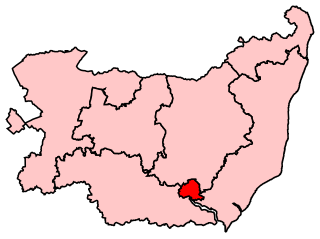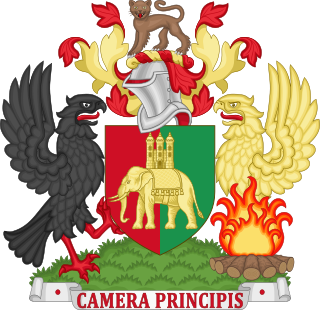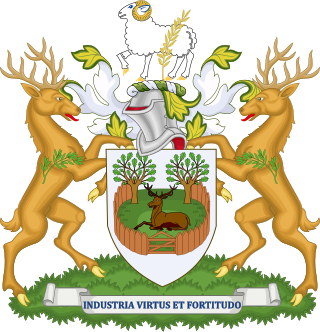Related Research Articles

The Borough of Guildford is a local government district with borough status in Surrey, England. With around half of the borough's population, Guildford is its largest settlement and only town, and is where the council is based.

Ipswich is a constituency represented in the House of Commons of the UK Parliament since December 2019 by Tom Hunt of the Conservative Party.

Coventry City Council is the local government body responsible for the governance of the City of Coventry in England, which has been a metropolitan district since 1974.

Leicester City Council is a unitary authority responsible for local government in the city of Leicester, England. It consists of 54 councillors, representing 22 wards in the city, overseen by a directly elected mayor. It is currently controlled by the Labour Party and has been led by mayor Sir Peter Soulsby since 2011. The council also appoints a ceremonial Lord Mayor who chairs council meetings; the directly elected mayor is termed the City Mayor to distinguish the post from the Lord Mayor.

Nottingham City Council is the local authority for Nottingham, a unitary authority with city status. Nottingham is in the ceremonial county of Nottinghamshire, England, but as a unitary authority the city council is administratively independent from the surrounding Nottinghamshire County Council. The city council consists of 55 councillors, representing a total of 20 wards, elected every four years. The council is led by David Mellen, of the majority Labour Party.

Suffolk County Council is the administrative authority for the county of Suffolk, England. It is run by 75 elected county councillors representing 63 divisions. It is a member of the East of England Local Government Association.
Clonmel was a United Kingdom Parliament constituency in Ireland, returning one MP from 1801 to 1885. It was represented in Parliament when the Union of Great Britain and Ireland took effect on 1 January 1801.
Sovereign is a title that can be applied to the highest leader in various categories. The word is borrowed from Old French souverain, which is ultimately derived from the Latin superānus, meaning 'above'.

Ipswich Borough Council is the local authority for Ipswich, a non-metropolitan district with borough status in Suffolk, England. It is the second tier of a two-tier system, fulfilling functions such as refuse collection, housing and planning, with Suffolk County Council providing county council services such as transport, education and social services.

Derby City Council is the local authority for Derby, a unitary authority with city status in the East Midlands region of England.
Ipswich Corporation was the local authority which ran the town of Ipswich in Suffolk, England. It was founded in 1200 and abolished in 1974, being replaced by Ipswich Borough Council. The corporation's formal name until 1835 was the "bailiffs, burgesses and commonalty of the town or borough of Ipswich", and after 1836 was the "mayor, aldermen and burgesses of the borough of Ipswich", but it was generally known as the corporation or town council.

William Scholefield was a British businessman and Liberal politician. He was a leading figure in the politics of the rapidly growing industrial town of Birmingham in the mid-nineteenth century, serving as the first mayor in 1838–39, and one of the constituency's two Members of Parliament from 1847 to 1867.

City of York Council is the local authority for York, in Yorkshire, England. York has had a city council from medieval times, which has been reformed on numerous occasions. Since 1996 the council has been a unitary authority, performing both district-level and county-level functions. It is composed of 47 councillors and has been under Labour majority control since 2023. The council is based at West Offices on Station Rise.

Buckingham was an ancient borough in England centred on the town of Buckingham in the county of Buckinghamshire, and was first recorded in the 10th century. It was incorporated as a borough in 1553/4 and reformed under the Municipal Corporations Act 1835. In 1974, it was abolished as part of local government re-organisation under the Local Government Act 1972, and absorbed by Aylesbury Vale District Council.

Stockton-on-Tees Borough Council is the local authority of the Borough of Stockton-on-Tees, which straddles the ceremonial counties of County Durham and North Yorkshire in England. Since 1996 the council has been a unitary authority, providing both district-level and county-level services. It therefore provides services including Council Tax billing, libraries, social services, town planning, waste collection and disposal, and it is a local education authority. Since 2016 the council has been a member of the Tees Valley Combined Authority, which has been led by the directly elected Tees Valley Mayor since 2017.

Benjamin Brame (1772–1851) was the first mayor of Ipswich Corporation following the creation of the role by the passing of the Municipal Corporations Act 1835. He was elected on 31 December 1835 and commenced his mayoralty on 1 January 1836.

The Borough of Chesterfield is a non-metropolitan district with borough status in Derbyshire, England. It is named after the town of Chesterfield, its largest settlement, and also contains the town of Staveley and the large village of Brimington.
Wisbech was a municipal borough in the Isle of Ely, Cambridgeshire in England from 1835 until 1974.
The title Bailiff of Ipswich was used from 1200 to 1834 for the most senior officers of Ipswich Corporation, the municipal corporation that owned property in and was responsible for the government of Ipswich. Although over 40 English towns had been granted corporate status by 1200, with the granting of the charter, Ipswich became one of the first towns to be granted the privilege of having two bailiffs elected by the inhabitants gathered in common council. The office was abolished with the implementation of the Municipal Corporations Act 1835, after which the most senior civic office in Ipswich was Mayor.
References
- ↑ Commons, Great Britain House of (1826). Journals of the House of Commons. London: H.M. Stationery Office.
- ↑ "The Mayoralty in Ipswich". www.ipswich.gov.uk. Ipswich Borough Council. Retrieved 12 March 2020.
- ↑ "Mayors of Ipswich | Ipswich Borough Council". www.ipswich.gov.uk. Ipswich Borough Council. Retrieved 29 August 2020.